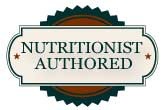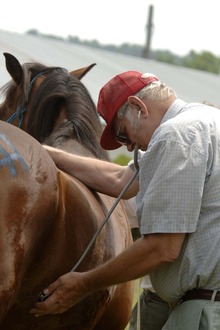
Your horse is in pain and needs bute. Bute causes ulcers – this we know. But knowing how it damages the lining of the gastrointestinal tract is the key to knowing how to prevent its damaging impact.
Your horse’s stomach – an acid production machine.
First, understand that most ulcers can easily be prevented by appreciating the way the horse’s stomach is designed. The lower portion (glandular region) is lined with a protective mucus layer, but the upper portion (squamous region) does not, which makes it especially vulnerable to stomach acid.

Lecithin - An answer to ulcers in horses
Even when horses are fed properly, administering non-steroidal anti-inflammatory drugs such as bute (phenylbutazone), Banamine (flunixin meglumine), or aspirin, can create ulcerations along the entire gastrointestinal tract.
Most ulcers occur here because the horse’s stomach continuously secretes acid, even when empty. A steady supply of forage – all the time, all day, and all night – will put the acid to its proper work and protect your horse’s stomach. This is the way horses are meant to eat – they are forage grazers.
But even when horses are fed properly, administering non-steroidal anti-inflammatory drugs (NSAIDs) such as bute (phenylbutazone), Banamine (flunixin meglumine), or aspirin, can create ulcerations along the entire gastrointestinal tract. This has to do with the way they reduce pain and inflammation.
We tend to assume that it is bute itself that is directly irritating the stomach lining. In actuality, the damage happens after the bute has been absorbed. Bute inhibits the cyclooxygenase enzymes 1 and 2; some of these enzymes reduce the formation of various prostaglandins, some of promote inflammation and pain. But others maintain the integrity of the entire digestive tract by stimulating the production of molecules known as phospholipids. Phospholipids form a barrier to help prevent stomach acid from damaging the underlying epithelium.
Antacids have a downside in horses
Our tendency is to get rid of the acid by administering antacids, H2 blockers, or the proton-pump inhibitor omeprazole (GastroGard®). But stomach acid is actually important--it is there for two reasons: First, it is necessary to initiate the digestion of protein, a nutritionally critical function. Protein digestion provides amino acids (building blocks of protein) for your horse’s overall health. And second, acid is your horse’s primary defense against all of the microbes that he picks up off the ground, some of which are potentially infectious.
If ulcer prevention is your goal, it makes sense to replace the phospholipids that have been reduced by NSAIDs.
Enter, lecithin
Lecithin is the common term for a phospholipid known as “phosphatidyl choline” (PC). It is a naturally occurring substance; it is the most abundantly found phospholipid in animal and plant cell membranes, and is most commonly derived from soybeans. Chemically, it primarily consists of essential fatty acids (both omega 3 and omega 6) along with a molecule of choline (an essential B vitamin-like nutrient).
Lecithin has been well studied in its ability to treat ulcers. Researchers* at the University of Texas Health Science Center in Houston examined the administration of PC along with NSAIDs and found that not only does PC significantly reduce gastrointestinal injury, but in some cases, it even eliminated gastrointestinal ulcerations. Furthermore, it offers this protection without altering the efficacy of bute (or other NSAID).
Lecithin is easy to feed
You can buy lecithin granules in any health food store, or in bulk through online providers such as BulkFoods.com. I recommend offering ½ to ¾ cup of lecithin with each dose of bute (for a 1000 lb horse). It can be mixed with any feed and is quite palatable. Another option is SBS Equine Products’ lecithin-based supplement called “Starting Gate.”
In addition to offering gastrointestinal protection, lecithin boosts the health of all cell membranes, including those of skin, hair, and hooves. And the body can also use the choline component to produce acetylcholine, a neurotransmitter necessary for proper neuromuscular function.
Summary
When pain relief is necessary and you rely on an NSAID such as bute, protect your horse’s digestive tract by replacing what bute diminishes—phospholipids found in the epithelial layer of the digestive tract. Phospholipids act as a barrier to acid damage. Lecithin (phosphatidyl choline) is a naturally-occurring phospholipid that can be easily supplemented to protect your horse against ulcers.
About Dr. Getty:
Juliet M. Getty, Ph.D. is an internationally respected equine nutritionist available for private consultations and speaking engagements. Dr. Getty is the Contributing Nutrition Editor for the Horse Journal, and her comprehensive reference book, Feed Your Horse Like a Horse is offered for purchase through her website and at Amazon.com. Also at www.gettyequinenutrition.com, sign up for her informative—and free—monthly newsletter, Forage for Thought, read articles, search her nutrition forum, enroll in upcoming teleseminars and purchase previously recorded events. Contact Dr. Getty directly at gettyequinenutrition@gmail.com.
* Source: Lichtenberger, L.M., Barron, M., and Marathi, U., 2009. Association of phosphatidyl choline and NSAIDs as a novel strategy to reduce gastrointestinal toxicity. Drugs of Today, vol.45, no 12, 877-890
